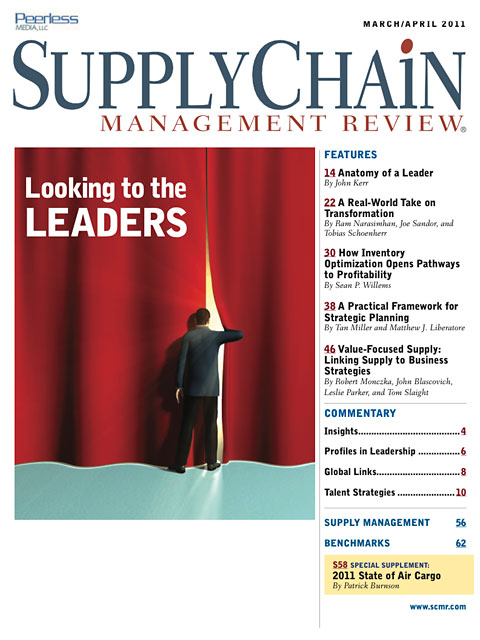Sorry, but your login has failed. Please recheck your login information and resubmit. If your subscription has expired, renew here.
March-April 2011
Leadership is one of the most popular topics we write about in SCMR. We all seem to be fascinated by individuals who can rally a company, a sports team, a country toward a shared goal. Yet when asked just what makes a good leader, most of us struggle with a precise answer. It's kind of: "Well I know what real leadership is when I see it." Reflecting our leadership theme this issue, we're pleased to introduce a new section of the magazine called "Talent Strategies." It's written by the experts at MIT's Center for Transportation & Logistics, which has both a depth of research and hands-on experience in… Browse this issue archive.Need Help? Contact customer service 847-559-7581 More options
The only constant in today’s world is change. Leading companies recognize this and understand that they must continually transform themselves to remain competitive. Over the past several decades, significant organizational transformations have been taking place, pushing firms to higher levels of performance and competitiveness. In many cases, these have been enabled by such proven techniques as total quality management and business process re-engineering. But merely repeating these traditional, largely internally focused, improvement initiatives is no longer enough. The kind of transformation needed today cannot be accomplished within the four walls of the firm. Real transformation—with the growth and business success associated with that—will come only with the engagement of the supply network.
With this foundational understanding of the transformation process, we have been convening a group of thought leaders—supply chain practitioners—at the Michigan State University Executive Summit, first held in 2007. The mission of this annual summit is to examine how supply management can be leveraged to drive organizational transformation and strategic change that leads to competitive advantage. We have called this supply-leveraged organizational transformation, or SLOT. (Later in the article, we will give more detail on the firms at the Executive Summit and their specific areas of presentation.)
Certainly, this is a timely issue: The amount spent on purchasing goods and services as a percentage of total revenue is increasing across virtually all companies, attesting to the growing importance of supply management. As the spending increases, so do the challenges…tougher competition globally, rising customer expectations, and shorter product lifecycles. This article explores the keys to supply management success in this environment.
 |
This complete article is available to subscribers
only. Click on Log In Now at the top of this article for full access. Or, Start your PLUS+ subscription for instant access. |
Not ready to subscribe, but need this article?
Buy the complete article now. Only $20.00. Instant PDF Download.
Access the complete issue of Supply Chain Management Review magazine featuring
this article including every word, chart and table exactly as it appeared in the magazine.
SC
MR
Sorry, but your login has failed. Please recheck your login information and resubmit. If your subscription has expired, renew here.
March-April 2011
Leadership is one of the most popular topics we write about in SCMR. We all seem to be fascinated by individuals who can rally a company, a sports team, a country toward a shared goal. Yet when asked just what makes a… Browse this issue archive. Download a PDF file of the March-April 2011 issue.
 |
Download Article PDF |
The only constant in today’s world is change. Leading companies recognize this and understand that they must continually transform themselves to remain competitive. Over the past several decades, significant organizational transformations have been taking place, pushing firms to higher levels of performance and competitiveness. In many cases, these have been enabled by such proven techniques as total quality management and business process re-engineering. But merely repeating these traditional, largely internally focused, improvement initiatives is no longer enough. The kind of transformation needed today cannot be accomplished within the four walls of the firm. Real transformation—with the growth and business success associated with that—will come only with the engagement of the supply network.
With this foundational understanding of the transformation process, we have been convening a group of thought leaders—supply chain practitioners—at the Michigan State University Executive Summit, first held in 2007. The mission of this annual summit is to examine how supply management can be leveraged to drive organizational transformation and strategic change that leads to competitive advantage. We have called this supply-leveraged organizational transformation, or SLOT. (Later in the article, we will give more detail on the firms at the Executive Summit and their specific areas of presentation.)
Certainly, this is a timely issue: The amount spent on purchasing goods and services as a percentage of total revenue is increasing across virtually all companies, attesting to the growing importance of supply management. As the spending increases, so do the challenges…tougher competition globally, rising customer expectations, and shorter product lifecycles. This article explores the keys to supply management success in this environment.
 |
SUBSCRIBERS: Click here to download PDF of the full article. |
SC
MR

Latest Supply Chain News
- Retail sales see gains in October, reports Commerce and NRF
- Balancing green and speed: Home delivery insights from the pandemic era
- AdventHealth named top healthcare supply chain by Gartner
- Geopolitical readiness in supply chains: Strategic challenges for leaders
- Unlocking retention: The role employee engagement plays
- More News
Latest Podcast

 Explore
Explore
Latest Supply Chain News
- Retail sales see gains in October, reports Commerce and NRF
- Balancing green and speed: Home delivery insights from the pandemic era
- AdventHealth named top healthcare supply chain by Gartner
- Geopolitical readiness in supply chains: Strategic challenges for leaders
- Unlocking retention: The role employee engagement plays
- Can supply chain managers embrace an entrepreneurial mindset?
- More latest news
Latest Resources

Subscribe

Supply Chain Management Review delivers the best industry content.

Editors’ Picks





